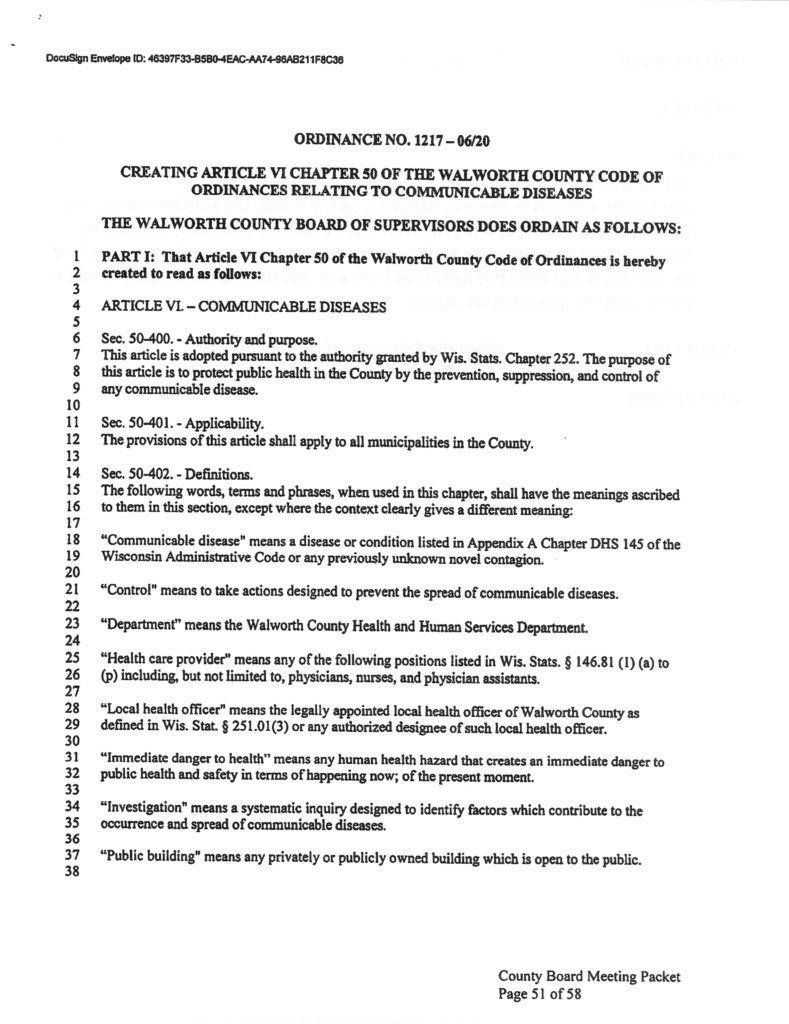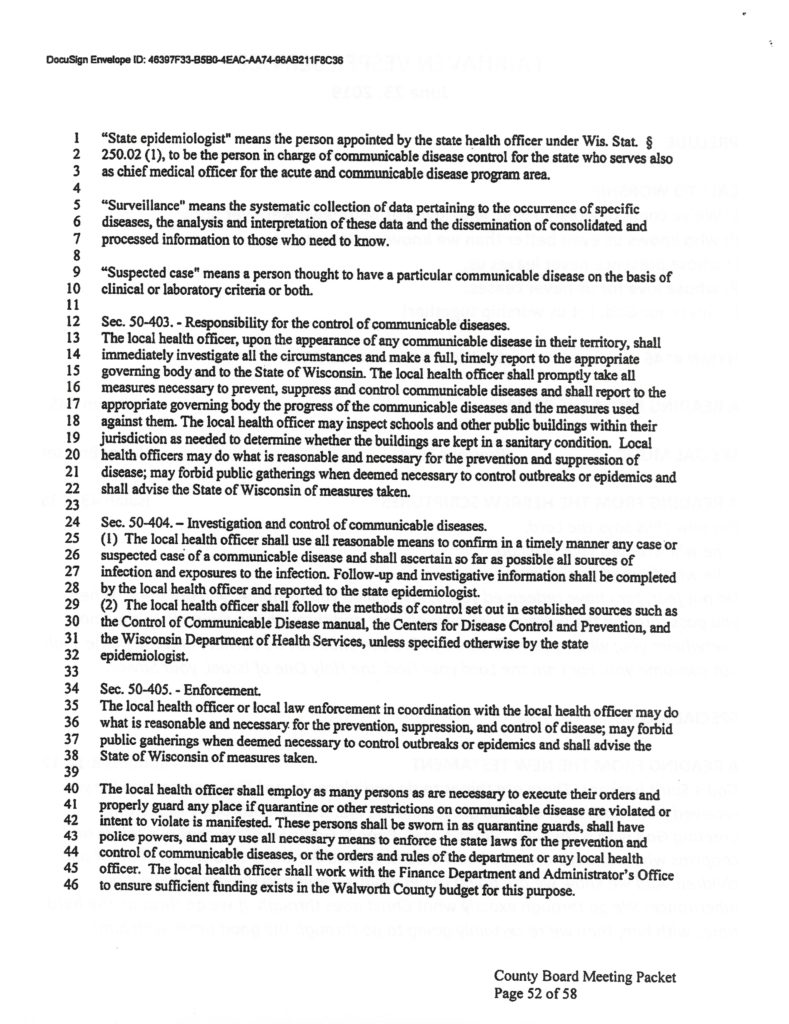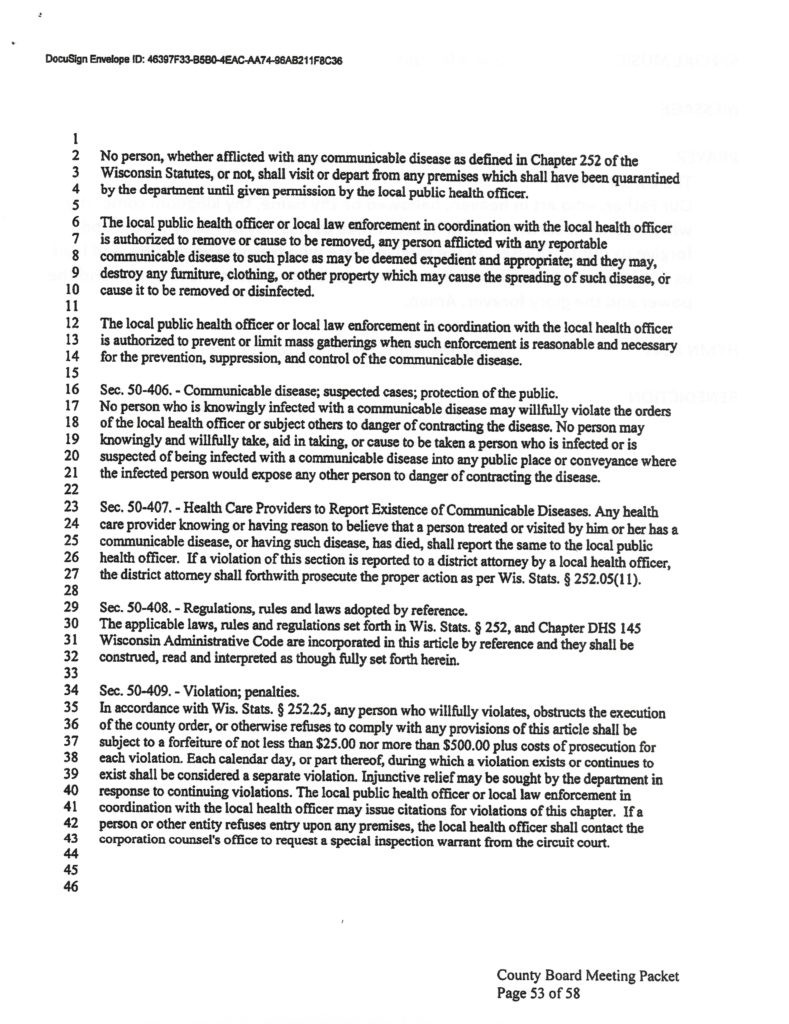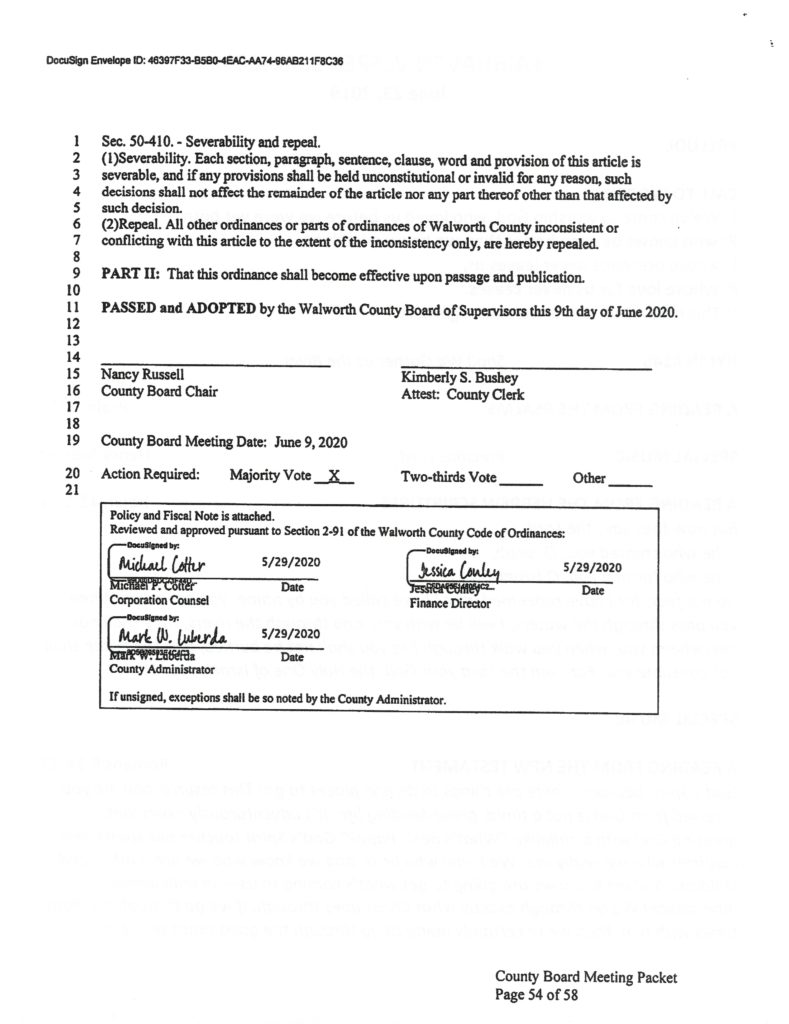
By Lynn Binnie
Whitewater Banner staff
whitewaterbanner@gmail.com
At its June 9 meeting (click here for video) the Walworth County Board of Supervisors listened for nearly two hours to public comments regarding a proposed ordinance (included at the end of this article) that would essentially adopt state statutes and codes authorizing their health officer to take certain steps to prevent the spread of contagious diseases. Although the ordinance was recommended by county officials shortly after the Safer at Home order was struck down, the health officials reported that there had not been any problems getting citizens to comply with orders pertaining to COVID-19. The ordinance could apply to any communicable disease, authorizing health staff to quarantine an infected person, involuntarily if necessary, using “quarantine guards.” Additionally, if deemed necessary, staff could order for a person’s furniture or clothing to be destroyed to avoid spreading disease. Violators, which could include businesses, could be subject to fines ranging from $25 to $500 per day. The proposal had been recommended by the Health and Human Services Committee at its meeting (click here for video) on May 20 by a vote of 7-1, with Supervisor Ryan Simons voting no.
The proposal from county staff resulted from a suggestion from the Wisconsin Counties Association that the counties check their ordinances to ensure that they had adopted the state statute. Apparently a large number of counties already had such an ordinance on the books. According to a member of the board who spoke with the Banner on condition of anonymity, although Supervisor Simons offered no reason for his opposition to the motion in the committee, afterwards he apparently made a number of contacts with citizens encouraging them to oppose the recommendation to the board. The unnamed supervisor also reported that Representative Cody Horlacher and State Senator Steve Nass posted comments on their Facebook pages encouraging people to speak in opposition to the proposal at the June 9 board meeting. (Click here for Rep. Horlacher’s Facebook post on June 9.) This struck the aforementioned supervisor as odd, in that the county proposal was essentially identical to existing state law.
Dozens of county residents, including three from Whitewater, spoke against the proposal. Many appeared in person in a nearly filled chamber, with virtually none wearing masks, while others spoke by telephone. Comments included accusations that the proposed ordinance would be unconstitutional, that it would be taking away freedoms guaranteed to citizens, that it was an “overreach,” granting unsupervised powers to unelected officials, and that there were no qualifications cited for health officials. Some people voiced suspicion that COVID-19 represents as serious a health threat as has been reported. The fact that quarantine guards would have “police powers” led some to believe (mistakenly) that they would be able to arrest people. “We are not scared of COVID-19,” said Sarah Hardison of Genoa City. “But we are terrified of government overreach and loss of freedom.” Madison Elmer, a resident of the town of Walworth, stated, “This seems like something that would happen in Russia – not here.” One citizen threatened to sue Walworth County if the public health measure was approved. Others stated that the board was trying to sneak something over without notice. Supervisors were threatened with being defeated in the next election. The crowd applauded, shouted, and occasionally heckled. Chairwoman Nancy Russell urged them to stop. Some responded with more applause and shouting. Only one person, Aaron Parker of Whitewater, spoke in support of the proposal, stating that he felt that freedom does not give “a license to do whatever you want regardless of how it impacts others.”
Following the citizen comments, County Corporation Counsel Michael P. Cotter indicated that the proposed ordinance was almost verbatim to language found in Wisconsin Statutes Chapters 251 (Local Health Officials) and 252 (Communicable Diseases), Wis. Adm. Code DHS 145 (Control of Communicable Diseases), and a Wisconsin Supreme Court decision in 1904, Lowe v Conroy. In drafting the proposal he added minimal language from other counties’ ordinances, as well as the proposed penalty. He chose to only include a monetary fine and not the provision for up to 30 days of jail time that the statute allows. Mr. Cotter stated that the ordinance “doesn’t expand the powers of the health officer other than to allow them to give a ticket to a person if they don’t abide by an order.”
Supervisor Daniel Kilkenny, although indicating that he would be voting against the ordinance, agreed with the perspective that the substance of the proposal is already in state law, and stated that those who oppose the provisions should be taking it up with their state representatives if they oppose the state’s approach to controlling contagious diseases. “If you woke up today thinking this didn’t exist, it already exists,” Kilkenny said.
After virtually no discussion, the board voted 10-1 to reject the proposed ordinance, with Jerry Grant offering the only dissent. The anonymous board member who spoke with the Banner indicated that she/he had voted with the majority only due to the public pressure, believed that Mr. Grant was in the right with his vote, and wished that they had felt that they could also vote that way.
After the meeting, the Banner spoke with County Corporation Counsel Cotter, who acknowledged that the extensive opposition to the proposal was a surprise. He stated that the basis of the state statute dates back to the late 1800s. In fact, the Wisconsin Supreme Court decision in 1904, Lowe v Conroy, did not question the decision of a local health authority to order the destruction, without a hearing, of cattle hide and meat that were believed to be infected with anthrax. Attorney Cotter stated that he did not feel that the Health and Human Services Department would be disadvantaged by the outcome. The health officer can still enforce the provisions of the state law; it’s just that if a citizen fails to comply with a quarantine order, the county will have to go to Circuit Court instead of “writing a ticket.” Although Cotter stated that he “understands the frustration,” of those speaking at the meeting, the county was not trying to sneak anything through, and he was glad that citizens were interested.
The Banner also contacted Carlo Nevicosi, Deputy Director of the County Health and Human Services Department, who commented, “I was certainly surprised by the public interest in the issue, although maybe I shouldn’t have been. It’s pretty rare that we get much public interest in our board meetings. Our Public Health still has all of the authorities it needs and we’ve used them quite judiciously over the years. I can think of only one case in the past few decades where we needed to use a quarantine guard. This was a situation related to active tuberculosis. I think I understand the crowd’s concerns with the ordinance. What may not be well understood is that State statutes 251 and 252 already grant health officers those authorities that were written into the ordinance. The larger issue for that concerned group may ultimately be with the state legislature that grants the authorities in the first place.”
According to a press release from Jefferson County, their Board of Supervisors is reviewing the potential for such an ordinance while awaiting further discussion, analysis, feedback from the public, and guidance from a statewide working group.
Finally, Banner staff reached out to Jerry Grant, the only board member who opposed the motion to defeat the proposed ordinance. Mr. Grant provided the following response:
“Dear Editor:
Whitewater Banner
This is the opinion of Jerry Grant, not of any other member of the Walworth County board.
The County Board meeting of June 9, 2020, received a large amount of public input concerning an ordinance involving authority of the County’s Health Officer. The comments provided to the County Board, except for one speaker, opposed the ordinance. The issue stressed was the amount of authority the County Health Officer would be given. Having the ordinance fail did not take any authority away from our County Health Officer that is not already provided for in the State Statutes. This was pointed out to the Board by the Corporation Counsel and County Administrator.
The State Statutes REQUIRE OUR HEALTH OFFICER TO ENFORCE THE STATE LAWS CONCERNING COMMUNICABLE DISEASES. The State Statutes, in part, read the local health officer shall promptly take all measures necessary to prevent, suppress, and control communicable disease. If local authorities fail to enforce the communicable disease statutes and rules the department shall take charge and expenses incurred shall be paid by the county or municipality.
If you really have the fear as stated at the County Board meeting, you really need to proceed with your complaint to the Wisconsin Legislature to have changes made in the laws.
Jerry Grant – Walworth County District 4″
**************************************************************************************************************************

























